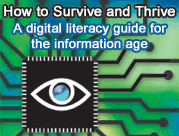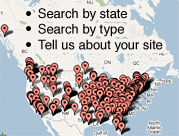![]()
Contact:
.(JavaScript must be enabled to view this email address), News Director for 6News
![]()
In Minneapolis, Sharing Lessons From the Newsroom
![]()
Largemouth, Minneapolis, Minn.
Created by former New York Times reporter Doug McGill, and launched in partnership with the Resource Center for the Americas
![]()
The Idea:
When he left daily journalism after working as a reporter for the New York Times and a bureau chief for Bloomberg News Service, Doug McGill wanted to find a way to share the best lessons of the newsroom with regular people and community activists using the Internet to create their own brand of civic journalism.
What McGill launched was Largemouth, a six-week journalism tutorial that covers topics ranging from ethics in reporting to the rise of citizen reporting. Stories produced by the citizen recruits are collected at Largemouth.org and featured at The Twin Cities Daily Planet,, a web-based community publication. An equally important result of the program, McGill said, is the enhanced media literacy among its recruits.
“It’s universal in this society that people distrust the media, they feel let down by the media, they feel like they’re not getting what they need and yet they don’t know how or where to start figuring out what the problem is,” McGill said. “So some structured discussion about that is really helpful to people.”
The Training:
Participants in the six-week training session meet once a week for three hours. Each workshop focuses on an assigned reading topic and a classroom feedback on writing assignments. McGill limits the class to 12 participants, and charges a $100 fee.
In class, citizen recruits learn basic reporting and interviewing techniques, story structure, and how to write opinion pieces. The workshops examine issues of ethics in journalism, how the media functions and the rise of citizen journalism. Each week, students complete a story assignment, which is circulated to other students by email in advance of class for discussion. Most workshops also include a discussion with a working professional journalist.
“You set the bar really high, expect people to do a lot, and some people will do every single thing, and they get a ton out of it,” McGill said. “Others, if they’re really busy people, which most of them are, they may not get everything, but they’re unbelievably grateful that it’s so rich, that the offerings are so rich.”
A training manual for the class can be viewed here.
The course syllabus is available here.
The Recruits:
The classes have attracted local leaders from non-profit organizations, along with a retired doctor, a grocery store worker, a newsletter editor, and public relations professionals. Class participants have been recruited through word-of-mouth and outreach efforts by the Resource Center for the Americas, a non-profit agency works with Hispanic immigrants in the Minneapolis area.
McGill said about 40 or 45 people have attended the four training sessions held in 2005 and 2006. Almost all of those have continued to work on writing and reporting projects in various forms, he said.
The course will change format beginning in 2007, when McGill becomes executive director of the World Press Institute at Macalester College in St. Paul, Minn. He plans to meet monthly with graduates of his program to work on ongoing projects.
The Results:
One student was working at a small grocery store that serves a large number of Ethiopian immigrants in 2005 when a family came into her store, looking distressed. They had just talked by phone with relatives in the capital city of Addis Abba, where violent riots had broken out in the aftermath of national elections.
“They were getting eyewitness accounts of a massacre in downtown Addis, which was not something that anything mainstream reporters even saw,” McGill said. “So the woman in my class, she just got out her pencil and her notebook and wrote down the accounts that her customers gave. ...She wrote it down, and she wrote a story, and we published it. And I daresay it gave some details of the events on that street in Addis on that day that you didn’t find in the New York Times or anywhere else. Citizen journalism at work. That’s the way it should happen.”
Work produced in the class is posted at Largemouth.org.
PREV: In Massachusetts, Senior Citizen Journalism Serves as Model





Comments
Be the first to leave a comment on this page!